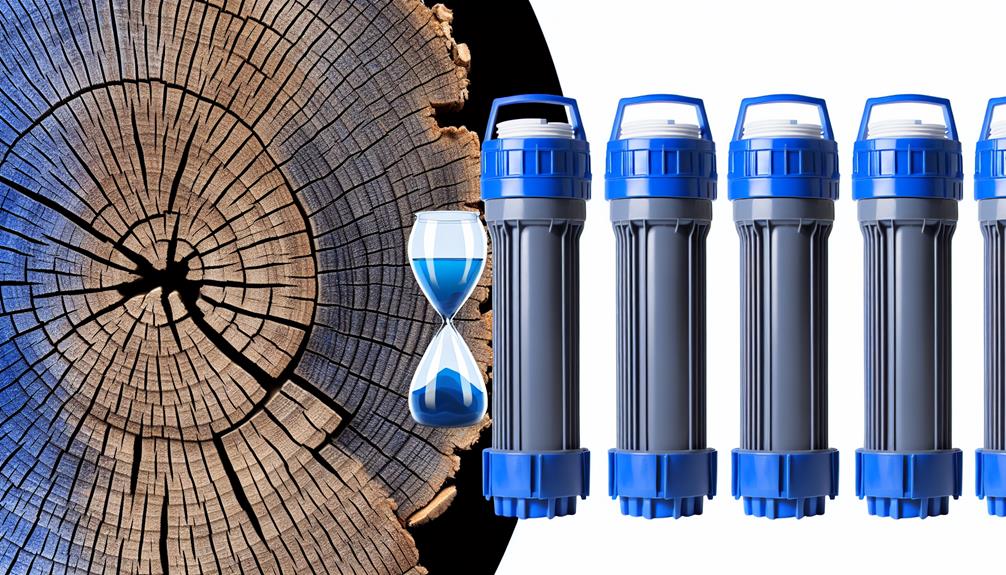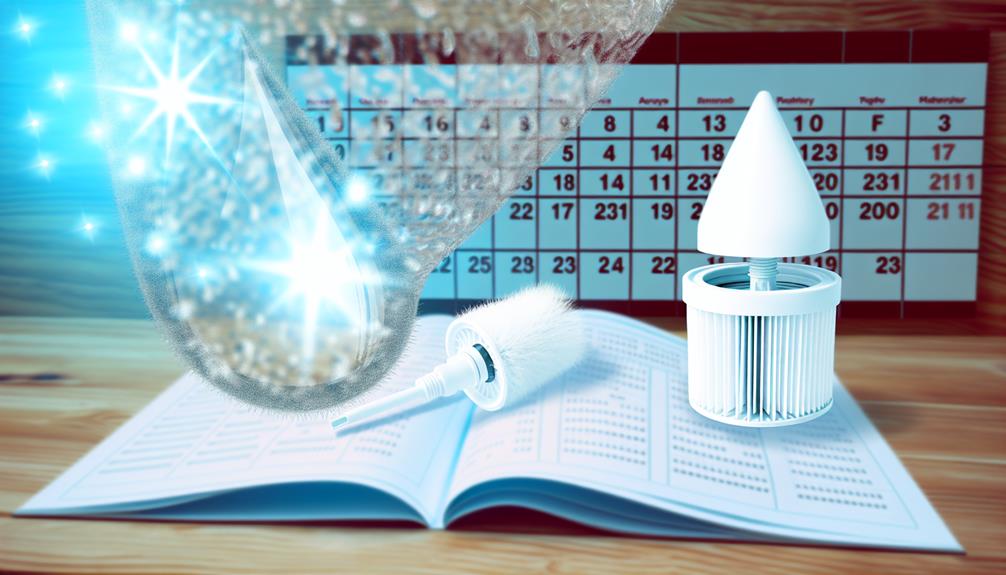Imagine you're on a long-haul flight, with the hours ahead of you stretching out like an endless road.
Just as the plane's fuel gauge determines how far you'll travel before needing to refuel, various factors dictate the lifespan of your water filter.
You're in the pilot's seat when it comes to maintaining the quality of your drinking water, and the choices you make—from the type of filter you install to how you manage its upkeep—can significantly influence how often you'll need to replace it.
In the journey to ensure the purity of your water, understanding the variables at play is crucial. You'll want to stay tuned as we chart these factors side by side, equipping you with the knowledge to gauge the longevity of your filter system and, ultimately, the quality of water in your glass.
Types of Water Filters
Exploring the variety of water filters available, from reverse osmosis systems that eliminate up to 99% of contaminants to convenient pitcher dispensers, allows you to tailor your water purification process to your specific needs.
Reverse osmosis water filters employ a semipermeable membrane to remove a vast array of impurities, leveraging a pressure-driven process. The efficacy of these systems is underscored by their ability to significantly reduce fluoride levels, among other substances.
Under sink filtration systems balance performance with affordability. They're designed for straightforward installation and maintenance, integrating seamlessly into your existing plumbing.
Faucet-attached filters offer a compact solution with an entry-level price, suitable if you're seeking immediate filtration without extensive setup.
Direct connect filters present a high-performance alternative that maintains ease of installation, ideal for those requiring robust filtration without the complexity of whole-house systems.
For a portable and installation-free option, filter pitchers and dispensers are accessible. These often utilize activated carbon or ion exchange technology to improve water quality.
Each type of water filter—be it a carbon filter, utilizing activated carbon, an ion exchange unit for water softening, or systems harnessing ultraviolet light—serves a distinct function within the spectrum of filtration systems, enabling you to address specific water quality concerns with precision.
Filter Usage Frequency
Having considered the various types of water filters, it's important to understand how often you'll need to replace them, as the frequency of use significantly affects their lifespan. The filter usage frequency is a critical determinant in estimating when a replacement filter is due. If you use your filter more often, the time to change it comes sooner because the materials that trap contaminants degrade with use.
Here are some factors to consider:
- Higher water flow through the filter can shorten filter lifespan.
- Frequent use necessitates more regular checks on the filter's condition.
- Certain types of filter are more robust and may tolerate high usage better.
- Lower usage doesn't indefinitely extend a filter's life due to material degradation.
- Some filters require backwashing or cleaning to maintain effectiveness.
Filters according to their design and material composition must be replaced after a specific volume of water has been treated or after a certain period, whichever comes first. It's not just about the water you consume; it's also about the quality of water and the level of contaminants it contains.
Water Quality Factors
When selecting your drinking water filter, it's crucial to evaluate the specific water quality factors in your area, as these will directly impact the filter's efficacy and longevity. Begin by reviewing your local water quality report, which details contaminants and hardness levels present in your tap water. Hard water, high in mineral content, often necessitates more frequent filter changes due to the accumulation of minerals that can clog the filtration system.
Your water filtration system's performance is contingent upon addressing the unique filter needs dictated by these water quality factors. Replacing filters becomes imperative when they reach their capacity for trapping contaminants. The harder your water, the more you'll need to replace filters to ensure a consistent supply of clean, filtered water.
Moreover, various water treatment systems are designed to manage different contaminants. If your drinking water contains high levels of specific pollutants, you'll require a filter tailored to remove those substances effectively. Consequently, understanding the exact makeup of your tap water is critical to selecting a filter with the appropriate capacity and technology, which in turn, influences how often you'll need to conduct maintenance and replace your filter to maintain optimal water quality.
Filter Maintenance Practices
Maintaining your water filter system requires regular replacement of filters to ensure peak performance and prevent undue stress on the components. Whether you're dealing with pitcher filters, countertop water filters, or whole house water systems, understanding and adhering to maintenance practices is crucial for optimal filtration.
- Check Replacement Schedules: Different water filters come with varying lifespans; always adhere to the manufacturer's recommended schedule.
- Monitor Filter Capacity: Be aware of how many gallons per minute your filter processes and replace it before it reaches its capacity limit.
- Automatic Replacement Services: Some brands offer subscription-based services to deliver new filters right when you need them.
- Ease of Replacement: Consider whether you can replace the filter yourself or if it will require a plumber.
- Regular Inspections: Periodically inspect your system to ensure there are no leaks or damage that could affect filtration quality.
Manufacturer's Lifespan Estimates
Manufacturers' lifespan estimates for water filters serve as a baseline, indicating the period after which a filter should ideally be replaced to maintain optimal performance, given standard water usage and quality conditions. When you're selecting a house water filter, these estimates are crucial in understanding the annual cost and maintenance schedule.
Analyzing how filters work, you'll find that over time, the accumulated contaminants can reduce the flow rate and compromise the filter's ability to provide powerful filtration. This means the filter's effectiveness diminishes long before you can visually detect any changes. Consequently, even if your water tested fine six months into the filter's life, it's not guaranteed to do so right up to the manufacturer's lifespan estimate.
Adhering to these estimates, which are often measured in gallons of water—the quantity your filter can clean before its performance declines—helps in preemptive maintenance. However, it's technical wisdom to monitor your water quality regularly. Variations in the source water's contaminant level might demand an earlier replacement, regardless of the gallons of water processed.
Ultimately, manufacturer's lifespan estimates offer a guideline, but they don't replace the due diligence of testing your water to ensure that you're consistently receiving the benefits of a fully functional water filter.

